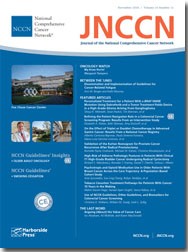Courtesy of the Journal of the National Comprehensive Cancer Network (JNCCN)
As reported in JNCCN, a recent study from McGill University shows that while opioid use increases during treatment in older patients with breast cancer, most do not continue use into survivorship; however, use of anxiolytics and antidepressants remains high in survivors.
 A new McGill University study published in the November issue of JNCCN – Journal of the National Comprehensive Cancer Network found that most patients with breast cancer aged 65 and older use psychotropic and opioid medications during active treatment and often in the first year of survivorship, despite this population’s vulnerability to adverse events. According to the authors, this study highlights the need for a multidimensional approach to distress and anxiety that includes comprehensive psychological intervention.
A new McGill University study published in the November issue of JNCCN – Journal of the National Comprehensive Cancer Network found that most patients with breast cancer aged 65 and older use psychotropic and opioid medications during active treatment and often in the first year of survivorship, despite this population’s vulnerability to adverse events. According to the authors, this study highlights the need for a multidimensional approach to distress and anxiety that includes comprehensive psychological intervention.
The study, “Psychotropic and Opioid Medication Use in Older Patients with Breast Cancer across the Care Trajectory: A Population-Based Cohort Study,” is available free-of-charge until February 28, 2017 on JNCCN.org.
According to principle investigator, Ari Meguerditchian, MD, MSc, FRCS, Assistant Professor in the Departments of Surgery and Oncology and member of the

Clinical and Health Informatics Research Group at McGill University, “women over 65 represent the fastest growing segment of breast cancer survivors. The fact that so many of them need medications for anxiety, depression, and distress even after active cancer care highlights the fact that we know so little about the specific needs of these patients.”
The researchers followed more than 19,500 women, 65 years or older, diagnosed with incident, non-metastatic breast cancer in Quebec, Canada, and analyzed the use of anxiolytics, antidepressants, antipsychotics, and opioids from precancer baseline through active care and into first-year survivorship. Ania Syrowatka, a PhD student under Dr. Meguerditchian and Dr. Robyn Tamblyn’s supervision was first author on the study.
The most prescribed drugs within the population were anxiolytics and antidepressants. Although the percentage of patients on opioids and antipsychotics was lower than the other drugs, with 16.2 percent of patients using antipsychotics and 25 percent using opioids, the authors noted a marked increase in use of opioids and antipsychotics—4.5- and 7-fold, respectively—from baseline to active care.
More than 50 percent of women studied used anxiolytics during care—an increase from 36 percent at baseline—and the vast majority of those women (44.4 percent) continued use of the medication into first-year survivorship. Moreover, use of antidepressants among the cohort was 22.4 percent, with 22.3 percent continuing use into survivorship.
Dr. Meguerditchian further noted, “Chronic use of these drugs is related to an increased risk of adverse events among these women, notably medication-related falls and injuries. Many studies suggest that this segment of the population is over-medicated.”
Conversely, the authors saw a notable drop-off in use of antipsychotics and opioids in first-year survivorship. This is likely due, at least in part, to the fact that antipsychotics and opioids are used to treat physical side effects of treatment, such as extreme nausea and pain, which decrease dramatically after treatment. Anxiolytics and antidepressants, on the other hand, are generally prescribed to combat the psychological aspects of diagnosis and treatment such as distress and anxiety, which have an extended effect on the patient.
“Our findings raise important questions about the lasting psychological impact of cancer, such as uncertainty of recurrence, family hardships, etc. Are we supporting our older patients as they move to survivorship? How can we best address their needs?” said Dr. Meguerditchian.
According to Crystal Denlinger, MD, FACP, Chief, GI Medical Oncology and Associate Professor in the Department of Hematology/Oncology at Fox Chase Cancer Center, “This study represents an important overview of high-risk medication use in a vulnerable population, namely older breast cancer survivors. The fact that women increase their use of psychotropic and opioid medications during treatment is not surprising due to the current treatment of nonmetastatic breast cancer (ie, surgery and cytotoxic chemotherapy), but the trend toward continued use into survivorship warrants further evaluation as to cause. Given the current campaign to curb opioid abuse in the general population, understanding the reasons for use of these medications and development of better interventions to address underlying causes is critical to ensuring the best outcomes for this, and potentially other, patient populations.”
Related coverage
Oncology Nursing News
November 23, 2016
